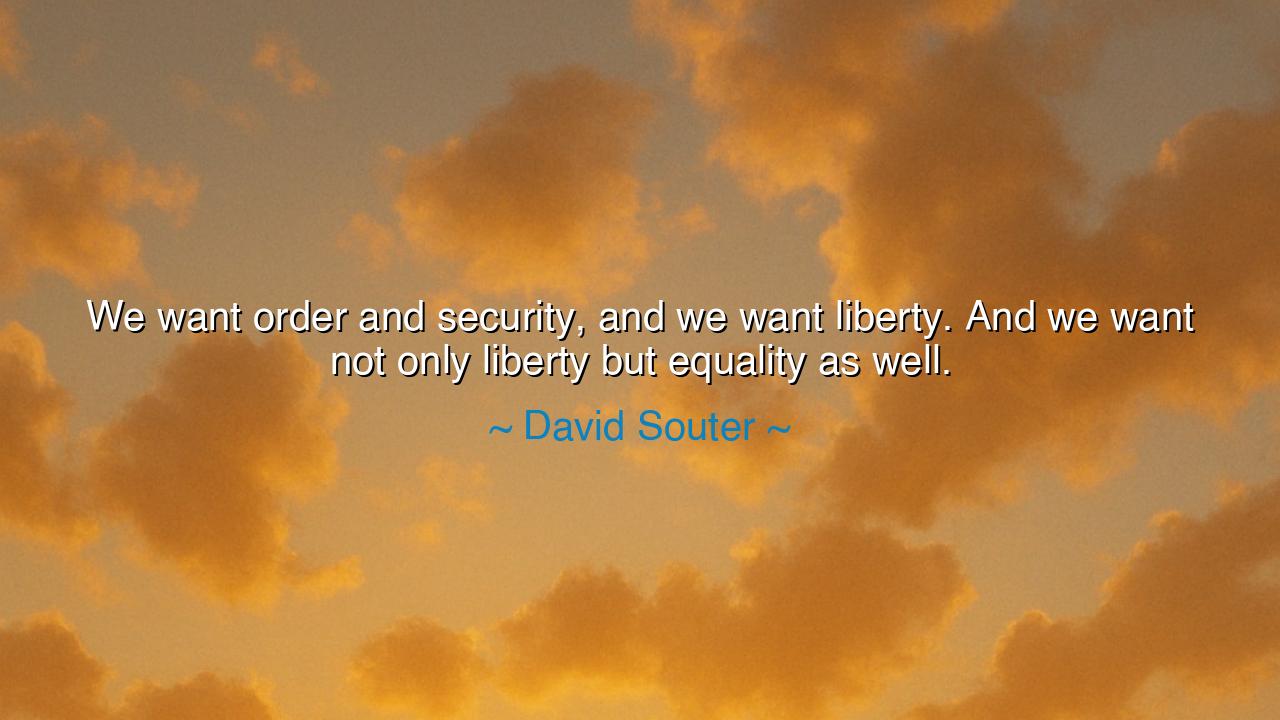
We want order and security, and we want liberty. And we want not
We want order and security, and we want liberty. And we want not only liberty but equality as well.






In the thoughtful and measured words of David Souter, a Justice whose wisdom was quiet yet profound, we hear the eternal struggle of the human soul and of civilization itself: “We want order and security, and we want liberty. And we want not only liberty but equality as well.” These words carry the cadence of ancient truth—the balance upon which nations rise or fall. For they speak to the tension that lies at the heart of every free people: the desire for safety and stability, the longing for freedom, and the moral demand for justice. Souter’s reflection is not merely political—it is philosophical, almost sacred. It reminds us that a society worthy of endurance must seek harmony between these three pillars—order, liberty, and equality—lest it collapse beneath the weight of its own contradictions.
The meaning of this quote unfolds like a triad of moral forces. First comes order and security, for without them, chaos reigns. Civilization depends on law, on trust, on the steady rhythm of safety that allows dreams to flourish. Yet, Souter warns, order alone is not enough—it can become a cage if not tempered by liberty, the breath of the human spirit. For liberty is the right to think, to speak, to worship, and to choose; it is the flame that keeps humanity alive and dignified. But liberty, too, without equality, becomes privilege—a freedom enjoyed by some and denied to others. Thus, Souter reveals a profound balance: these three ideals must exist together, for each one without the others becomes a distortion of itself.
The origin of this truth lies deep in the soil of history. Every generation has wrestled with this balance. Ancient Athens gave birth to democracy, yet struggled to extend its freedoms beyond the elite. The American Founders, in their brilliance, wrote of liberty and justice for all, yet the shadow of slavery haunted their creation. David Souter, standing centuries later, looked upon the evolution of law and society and saw that the challenge remained the same. His words, delivered after his service on the Supreme Court of the United States, reflect a lifetime of observing how societies oscillate—too much order becomes tyranny; too much liberty without equality becomes anarchy or oppression. His wisdom is thus both ancient and modern—a reflection of humanity’s enduring quest for balance and fairness.
Consider the story of President Abraham Lincoln, who in the crucible of the Civil War faced this very trinity of ideals. The Union sought order—its preservation. The people demanded liberty—freedom from tyranny. And Lincoln, through the Emancipation Proclamation, declared equality—not as an abstract principle, but as a living law. In doing so, he risked the very order he sought to preserve, believing that peace built upon injustice was no peace at all. His leadership embodied Souter’s truth: that real stability cannot exist without fairness, that freedom cannot endure if it is not shared, and that equality must walk beside order and liberty, lest both become hollow.
Souter’s words also carry a quiet warning to those who would exalt one value above the others. There are those who pursue security at the expense of freedom, who believe that safety justifies control; and there are others who worship liberty without restraint, forgetting that freedom without law can devour itself. Yet, the true wisdom lies in balance—to cherish order not as domination but as structure, to protect liberty not as license but as dignity, and to pursue equality not as sameness but as justice. Only through this harmony can a society remain both strong and humane.
His insight is particularly vital in times of fear or unrest, when voices grow loud and tempers short. In such moments, people often cry out for safety, even if it costs their freedom, or for freedom, even if it fractures their unity. Souter reminds us that the human heart desires both—to live without fear, and to live with purpose. And beyond even that, he says, we yearn for equality, the final and highest measure of moral civilization. For what use is liberty if only a few may taste it? What worth has order if it protects the powerful and not the weak? His vision calls for the wisdom to see that the well-being of one depends on the dignity of all.
Therefore, O seeker of truth, take this lesson to heart: balance your life, as a just nation must balance its soul. Uphold order, for chaos is the enemy of peace; cherish liberty, for without it life loses its light; and guard equality, for it is the compass of righteousness. When you speak or act, ask yourself—does this bring harmony between safety, freedom, and fairness? Let these three be your moral trinity.
And so remember the wisdom of David Souter, who spoke not as a judge of law alone, but as a judge of the human condition: that a free society is a delicate harmony between order, liberty, and equality. When one falters, all tremble. When all three stand together, justice reigns. May every nation, and every soul within it, strive to keep this sacred balance alive—for it is the foundation not only of law, but of peace itself.






AAdministratorAdministrator
Welcome, honored guests. Please leave a comment, we will respond soon